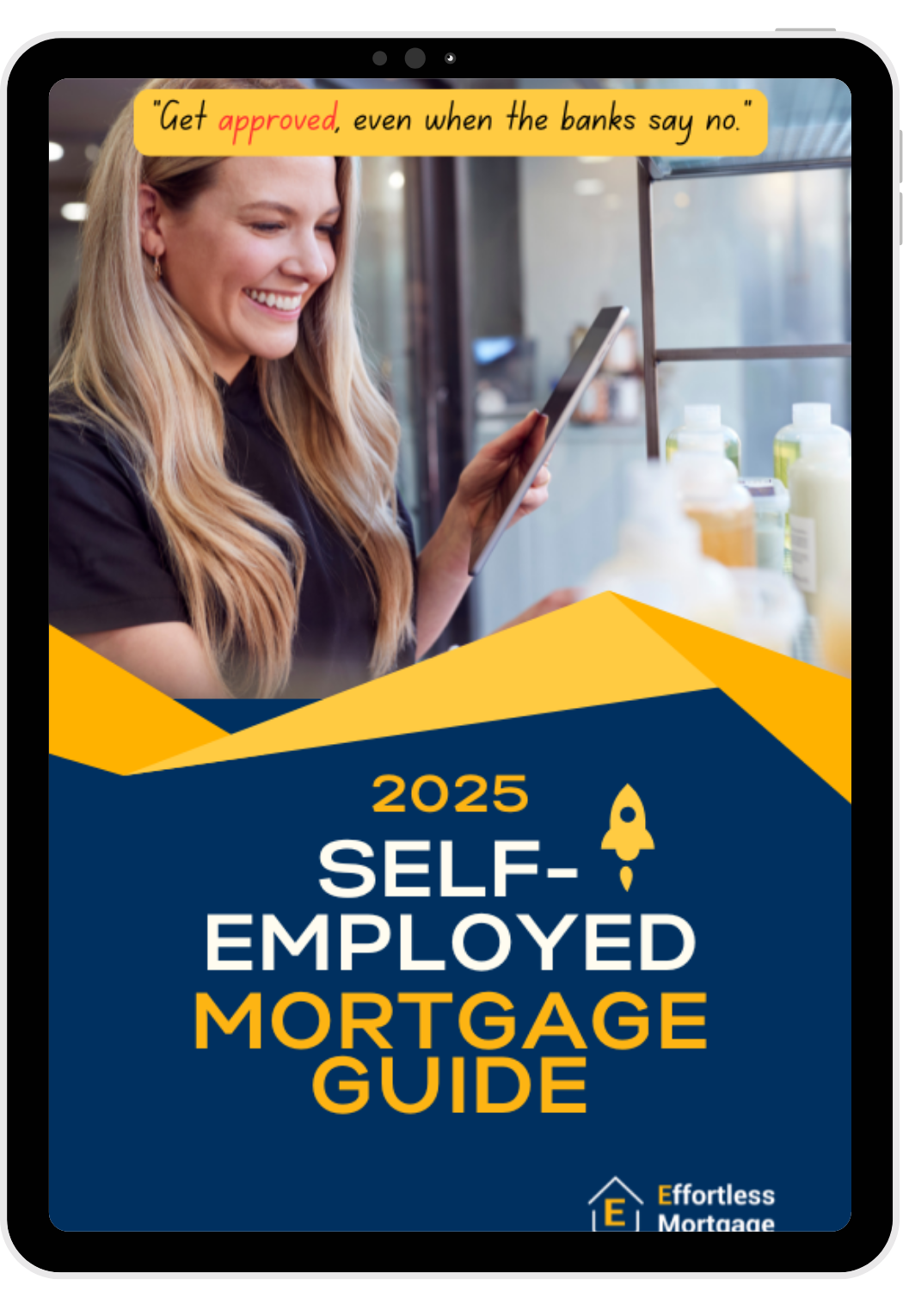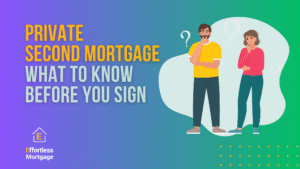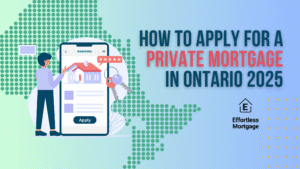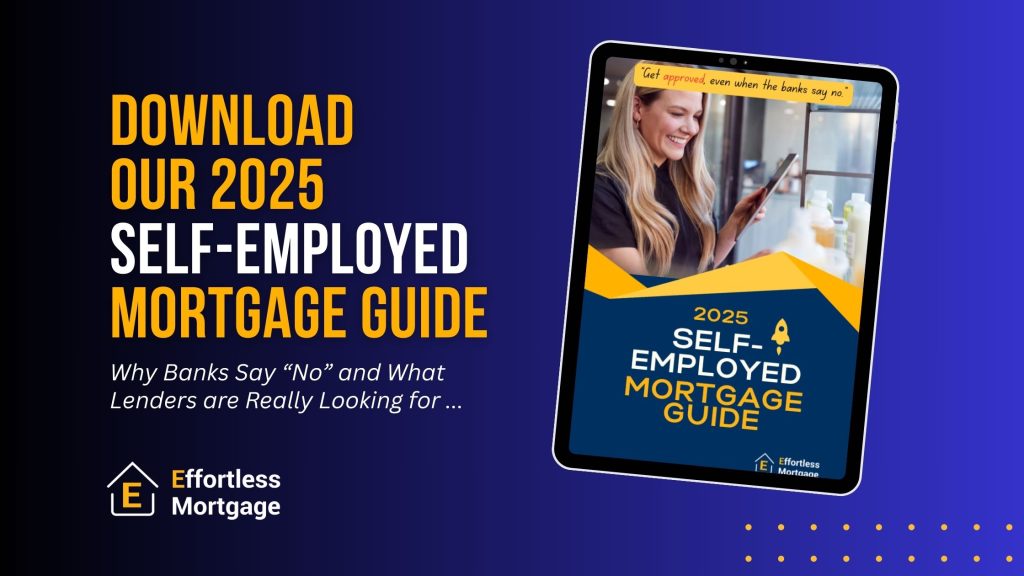
📥DOWNLOAD PDF: Your 2025 Guide to Getting Approved as a Self-Employed Borrower
Whether you're a business owner, freelancer, or gig worker, this self employed mortgage guide will explain why banks say no, what lenders really want to see, what docs you need, how to boost your approval odds with B and private lenders, and real approval strategies.
The rules of getting a mortgage haven’t caught up with how Canadians actually earn a living. If you’re self-employed, run a small business, or earn freelance/gig income, banks often treat you like a high-risk borrower—even when your income is strong. And in today’s market, with interest rate fluctuations and U.S. tariffs putting added pressure on some industries, it’s never been more important to work with a broker who understands your financial story.
Why Banks Still Say No (Even When You Can Afford the Mortgage)
Being denied by a bank doesn’t mean you can’t afford a mortgage—it just means the system isn’t built for how you earn. Traditional lenders rely on rigid criteria like T4 income or salaried employment, which puts self-employed Canadians at a disadvantage.
You don’t have a T4—lenders discount non-traditional income
Your net income appears low due to tax write-offs
Your business income fluctuates month-to-month
Industry concerns (retail, construction, real estate, logistics) are under extra scrutiny in 2025 due to global economic shifts like the U.S. tariff shakeup
What Lenders Are Actually Looking For (Behind the Scenes)
Even if a bank turns you down, there are lenders who want your business—but they’re looking at a different set of data. Understanding what they evaluate can change your approach (and improve your chances of approval).
Ability to service your mortgage demonstrated by cash flow. You’ll have to provide income proof in one form or another.
Proof the business exists to prevent fraud risks (i.e. business registration number, articles of incorporation (if incorporated), notice of assessments (NOAs), bank statements, etc.)
Credit score and repayment history to demonstrate character
Availability of down payment or home equity
Does your business case or story make sense
💡 Tip: Some B and private lenders now accept 12-month bank statement programs, especially for freelancers and gig workers.
📂 Additional Tip: If you’re incorporated, you may be able to use a combination of salary, dividends, and retained earnings in your qualification. An experienced broker will help you determine how to present this income clearly to lenders.

📥DOWNLOAD PDF: Your 2025 Guide to Getting Approved as a Self-Employed Borrower
Whether you're a business owner, freelancer, or gig worker, learn why banks say no, what lenders really want to see, what docs you need, how to boost your approval odds with B and private lenders, and real approval strategies.
Exploring Self-Employed Mortgage Solutions in More Detail
Now that you know what lenders are looking for, let’s break down the specific programs and scenarios that can work in your favour—even if you’ve been turned down by a traditional bank. These alternative solutions are specifically designed for business owners and freelancers who may not fit the standard T4 model.
How to Qualify for a Mortgage Using Business Deposits or Cash Flow Only
If your tax returns don’t reflect your true earning power due to write-offs, some lenders allow qualification based on average deposits into your business or personal account. This is commonly referred to as a “bank statement program.”
These programs assess:
Your average monthly deposits over 6 to 12 months
Consistency and volume of income
Whether your expenses seem reasonable given your deposits
This method is ideal for business owners with strong revenue but low net income.
How Does the Self-Declared Income Program Work? (B Lending)
B lenders understand that self-employed income isn’t always straightforward. Through a self-declared income program, you’re allowed to state a realistic income amount that reflects your true earnings—even if it’s higher than what’s shown on your tax return.
Lenders will still verify that the stated income makes sense compared to your deposits and business activity.
A Self-Declared Income Statement or Worksheet may include:
- Gross income
- Cost of goods sold (inventory, materials, and related expenses)
- Operating expenses (utilities, insurance, rent, advertising, etc.)
- Business-related travel and transportation expenses
- Net income after deducting all business costs
- Other sources of income related to the business (if applicable)
- Total declared income used to qualify for the mortgage
This program is helpful for business owners who manage expenses aggressively for tax purposes.
How Much More Mortgage Can You Qualify for with Self-Declared Income?
Using a self-declared income approach can significantly increase your mortgage eligibility. For example:
Declared income: $50,000 vs Taxed income: $30,000
Assuming 30-year amortization and 5% interest:
- $30,000 income = ~$175,000 mortgage
$50,000 income = ~$295,000 mortgage
That’s a $120K+ difference in borrowing power—simply by presenting your income more strategically.
📌 Tax Tip: If you’re planning to buy in the next 12 months, consider limiting your tax write-offs. While deductions reduce your tax bill, they also reduce your declared income—which lenders use to assess how much you qualify for.
What Are the B Lending Terms and Rates for Self-Employed Mortgages?
B lenders offer flexible programs for self-employed borrowers, but the terms can differ slightly from traditional banks:
Interest rates: Typically 0.5% to 1.5% higher than A lenders
- Down payment / Equity: Minimum 20%
Term Length: Often 1 to 3 years (vs. 5 years with A lenders) but many lenders offer longer terms
Prepayment: Many allow up to 20% lump sum per year
The rates are still highly competitive — and often worth the flexibility if it gets you into the market.
Here are links for more in depth on B Lender Mortgages and B Lender Mortgage Rates.
What Documents Do I Need to Provide B Lenders for a Self-Employed Mortgage?
To qualify with a B lender, you’ll typically need:
2 years of personal Notice of Assessments (NOAs)
6-12 months of personal and/or business bank statements
Proof of business registration or incorporation
A completed mortgage application
A self-declared income letter / statement (showing income, cost of goods sold, cost of operations), if applicable
Proof of down payment (bank statements, gift letter if needed)
Some lenders may also request business financials, invoices matching deposits in statements…
📊 Planning Tip: Keep your personal and business accounts separate. Not only does this help with financial management, but lenders will more easily verify your income and cash flow and goes a long way in showing professionalism. It also makes it much easier to provide the documentation lenders need, without unnecessary back-and-forth.
How Effortless Mortgage Gets You Approved
At Effortless Mortgage, over 30% of our funded clients are entrepreneurs, freelancers, or self-employed professionals. We know the challenges you face—and we know how to present your file to lenders that see your value.
✅ 90+ lenders, including B lender and private lender options
✅ Qualify you based on cash flow vs. taxable income
✅ Get approved despite bruised credit
✅ Personalized guidance to prep your documents and story
✅ Best rates for self employed / business owners
🔍 Key Insight: Banks often look at your average net income from your last two tax years. If the most recent year was lower, they may average it out or use the lower of the two. One of our Effortless Mortgage advisors can match you to lenders that will take the higher income year instead, or even just one strong year.
The 3-Step Mortgage -Ready and Approval Strategy
It’s not just about income—it’s about strategy. Our proven 3-step approach helps self-employed borrowers get mortgage-ready and confident before they even apply.
1. Start with a Clear Plan and Know Where You Stand
We begin with a short discovery call to assess your income type and guide you on the exact documents you’ll need.
2. Match with the Right Lender
We shop 90+ A, B, and Private lenders—so you don’t waste time or money. We can qualify you on your cash flow not just taxable income.
3. From Plan to Approval
We walk you through your top mortgage options and support you through every step until the deal closes.
2025 Challenges & Smart Moves for Business Owners
Entrepreneurs are facing more uncertainty than usual in 2025. Whether it’s market volatility, higher costs from tariffs, or more cautious lending policies, having a flexible mortgage plan can help you weather it all.
U.S. tariffs may affect sectors like manufacturing, importing, or retail
Interest rates could shift again—get pre-approved now and lock in
Refinancing with equity can support your business expansion or reduce high-interest business debt
Ready to Get Approved?
Don’t let traditional rules block your next move. Whether you’re buying a home, refinancing to fuel your business, or just want options that actually work for your income type—Effortless Mortgage can help.
📲 Call us at 1-888-978-4984
📩 Email info@effortlessmortgage.ca








